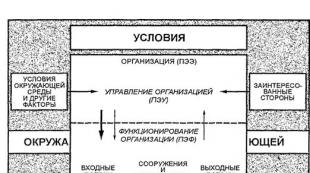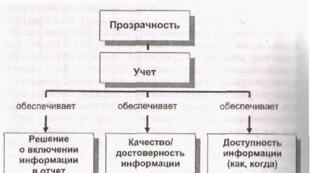Konosuke Matsushita's principles of success read. Konosuke Matsushita's principles of success. An effective formula for employee training
Every self-respecting businessman knows who the Japanese genius Konosuke Matsushita is and how he achieved success.
The Matsushita Electric company and its Panasonic brand are known all over the world, but its founder Konosuke Matsushita achieved success and worldwide recognition without even having an education.
Biography of Konosuke Matsushita
Konosuke Matsushita was born on November 27, 1894 into a peasant family. He was the youngest child. His family owned lands and was considered wealthy until the head of the family lost all his savings and lands on the stock exchange.
The family became poor, two older brothers died. So, at a very young age, Konosuke became the heir and the only hope of his family. The boy worked in his father’s shoe store, in a workshop making floor-standing stoves for homes, and in a bicycle shop. This is how the working career of the future founder of Matsushita Electric began.
The beginning of success
Years passed, the first trams began to appear in Japan, and Matsushita realized that the future lay in electricity. He goes to work at the Osaka Electric Light Company, which produces lighting products. He first worked as an electrician's assistant, then became an electrical wiring foreman. There he invented his first modified electric lamp socket. But the company’s management did not accept this innovation, and Konosuke Matsushita decided to quit and open his first business - the production of power plugs. 
But disappointment awaited him. Although the first batch was made quickly, its sales were very difficult - sellers were afraid to purchase such an unusual, innovative product.
It was necessary to expand production and experiment to improve the design and quality of their products. Everything required funds, which were not enough.
Salvation came in the form of a large order of 1,000 parts for electric fans. The profit was small, but it helped to cope with the first crisis, expand production, and increase the range. Now the Matsushita Denki company, which is what Konosuke Matsushita called his brainchild, also produced bicycle lights.
The predecessors of these lanterns were expensive gas lamps that lasted only a few hours. Matsushita changed the shape of the lamp and added a battery to the design, which could work for tens of hours. However, there was no demand, again due to the caution of sellers. And Konosuke Matsushita for the first time proposed selling goods without advance payment, 30% cheaper and 30% better. The company has always adhered to this principle. Matsushita Electric is characterized by the fact that it does not create a new product, but modifies and reduces the cost of what is in demand on the market today.
The company began to flourish, and new orders for bicycle lights appeared. They became so popular that in many families they began to replace kerosene lamps. And Matsushita began producing electric table lamps, which became known as the “nationwide Japanese lamp.” This is how the National brand was born.
However, the further development of the company was difficult. The economic crisis, the so-called Great Depression, which spread like a wave from America to Japan, war - all this had a negative impact on the company's condition. The country began widespread layoffs of workers, closures of enterprises and factories. Then Konosuke Matsushita made a decision: not to fire the workers and maintain wages. It was then that the principle sounded:
“Business is something that some people do for the happiness of others.”
For employees, their director became a real leader, an idol, the “god of management.” The workers worked half a day, the rest of the time they sold products. Soon, all the warehouses were empty. The company not only retained all its employees and made a profit, but also began producing radio products and electric irons. The crisis was overcome.
Management principles
- Business
“Business is people” is one of Konosuke Matsushita’s sayings.
He was sure that without understanding people and their nature, it is impossible to run a successful business.
There is such a characteristic feature in the Japanese mentality - involvement in national unity. This principle was taken by Konosuke Matsushita as the basis for building his relationships with employees.
He opened an Institute for training employees. He also created educational principles according to which the prosperity of the company is directly related to the prosperity of each employee and even the entire nation. That is why, every morning before the start of the working day, all employees sing the company's anthem, which inspires them to give their full attention to their work.
“A businessman is an artist with multifaceted talent” -
So wrote Konosuke Matsushita in his book “The Principles of Success.” He believed that just as an artist skillfully uses paint, canvas and brush to create a masterpiece, so a businessman must skillfully use people, money and goods to offer the market products that sell.
The principles on which the organization is built are of great importance. They must be solid and organic, because business is a “social phenomenon.” It involves public resources: money, equipment, people with their abilities. What a businessman does should be natural: produce products that people need and receive a reasonable profit for it.
- Perseverance is the key to success
You cannot stop halfway and give up on your dreams - this is what Konosuke Matsushita encourages his listeners and readers to do. Many people work hard, use all their skills and talents, but still do not get the desired result just because they stopped at half of what they achieved.
- Failures are necessary
"Good times are good, but bad times are even better." Another principle that was derived from personal life experience. Things can't always go smoothly. Success gives way to failure. And then you cannot give up, because it is at such moments that you have the opportunity to think about those things that you did not think about during times of prosperity. It is at such moments that perspectives and horizons open up.
- Continuous development
Society, nature, people, organization - everything is in continuous development. Business must go in the same direction as society, with its changes and needs. It is necessary to correct old mistakes so as not to make new ones. Strive to be open to change. Try to develop, do your job better and better every day, and success is guaranteed.
- The right priorities
There are often situations in the life of a company when a manager must make difficult decisions. First of all, you must be an impartial professional. And only then turn to feelings. It is equally important to hear the opinions of others. It allows you to learn and draw the right conclusions. Don’t be afraid to ask people for advice, because “collective wisdom is the basis of management.”

It is better to pay attention to the strengths of your employees. Encourage your subordinates. Sometimes passion is more important than talent to get the desired result.
We must not forget about punishment and reward. Every leader must find a balance in applying these two rules, because this is the only way to maintain order in the organization and achieve success in their business.
- Job
Any person wants to put off difficult things until later. You need to change your attitude towards work and start doing everything in order. Even if you lack knowledge or qualifications, by working hard and training your skills every day, anyone can become a good specialist.
Business is a team game. Without the help of associates and colleagues, it is impossible to cope with even easy tasks.
Don't be afraid to be an innovator. Staying ahead of the curve and not being afraid to experiment is another principle of business success.
It is very important to communicate with people. Whether they are workers, assistants, employees or clients, convey your warmth and sincerity to them through simple communication.
The life path of the famous businessman was not easy and thorny, there were many difficulties and downfalls. But Konosuke Matsushita never lost heart and was true to his principles, which he generously shared in his books.
Konosuke Matsushita
Principles of success
KONOSUKE MATSUSHITA (1894–1989)
The founder of the Matsushita Group and PHP Institute, Inc., Konosuke Matsushita was born in Wakayama Prefecture on November 27, 1894. When he was 9 years old, he went to Osaka City to study. In 1910, he joined the Osaka Electric Light Company (now Kansai Electric Power) as an installation technician in the internal wiring department.
In 1918 he founded the Matsushita Electric Company, which in 1935 was transformed into Matsushita Electric Industrial Co., Ltd. with Matsushita as president. In 1961, Konosuke became chairman of the board of directors, and in 1973 he accepted the post of consultant to senior management.
In 1946, he founded the PHP Institute to research and disseminate ideas of peace and social prosperity, both spiritual and material.
Preface to the English edition
Words have power. They are magical.
One word can bring the untold
happiness and ignite deep passion.
One word can create pitch darkness
One word can make a huge difference in your life.
opportunities and fulfill your desires.
One word can destroy a life forever.
Indeed, words have power. They
magical.
Katsuhiko Eguchi. People first
Sometimes words carry enormous weight. They can completely change our lives, for better or worse. We do not know when - in the normal course of life or during work - words can open up some new paths or opportunities for us.
Ideas expressed in a few words can sometimes be the most effective and carry great power. This book presents 105 principles drawn from the vast mass of what Konosuke Matsushita has written, expressed in interviews, reports, or other materials throughout his 94-year life, from the day he founded a workshop with three employees that has grown to one of the largest corporations in the world. Subtle changes have been made to the original texts to make these ideas more clearly understood throughout the world, whether they apply to business, work or everyday life, as they have been proven effective in achieving success.
True success is achieved when a person can fully reveal all his talents. Such a person has achieved the fulfillment of all his desires, and he is happy. Success, however, is not something that comes by itself, without effort and without hope, and people who do not accept this world or hold negative views cannot achieve success. Human life unfolds only in accordance with what we strive for. This means that if we want to achieve something, then the first thing we need to do is to passionately want success, and then honestly and sincerely achieve this goal, believing that you will actually achieve it. With this approach, when your life slows down or is completely upside down, the book can help you discern the contours of success if you thoughtfully re-read these revelations that continue to lead us back to true values, transcending time and space. We hope that this book will lay the foundations so that the reader can begin to build his own philosophy of success.
We thank Lynne Riggs for translating this book and Mark Schreiber and Manabu Takeshi for editorial assistance.
Yasunori Ishizaki,
International department of the PHP Institute,
June 2004
Management
Business is something that some people do to make others happy.
Business is one of human aspirations. The head of the enterprise, his employees, suppliers, consumers - they are all people. They are all involved in the common pursuit of the happiness of mankind. When running a business, you need to deeply understand people and their inner nature.
A business enthusiast is an artist creating on an endlessly unfolding canvas.
Just like an artist uses paints, brushes and canvas to create a beautiful picture, a businessman uses people, goods and capital to develop new products and offer services in response to the ever-changing needs of the times. In this sense, a businessman is an artist with multifaceted talent.
The normal growth of an organization depends on the soundness of its business principles.
There are many things to remember when running a business, but the most important are: why does the company exist? And how it should be managed. Having strong principles is critical. After all, only with clear and well-founded business principles can you create a healthy enterprise.
Any business - a public phenomenon, you should not think of it as private property.
Since any organization strives for prosperity by using public resources - land, money, equipment - and human labor and talent, it is responsible to society for what it does. In this sense, the organization is a social phenomenon. You shouldn't think that you can do whatever you want with a business just because you own it.
If you do what is reasonable and natural, like opening your umbrella when it starts to rain, your business will prosper.
When you go out in the rain or on a cloudy day, you naturally take an umbrella. Thus, you follow the laws of common sense: you know that if you do not want to get wet in the rain, you need to take an umbrella. The same can be said about business. You produce good products and make reasonable profits. In a simple situation, these are completely normal actions, you will have few mistakes, and your enterprise will be successful.
Agree that society always knows better. If you are willing to accept this, you will be successful.
There may come a time when you believe that you have a great idea and will work as hard as you can on it, but society will not want to recognize your efforts. If you are tempted at such times by the idea that society is wrong, you will lose the opportunity for further personal growth. From time immemorial, society is certainly right, and it is important to keep this truth in the heart.
If you run your business with smart ideas and the right methods, you will achieve your goal.
When spring comes, you cultivate the fields and sow seeds. You water the seedlings and do everything possible to protect the crop from pests, hurricanes, heavy rains or drought. If you work hard, you will reap a bountiful harvest. It's the same in business: if you act intelligently, apply the right methods and work conscientiously, you will get good results. If you work hard and there is no result, then you made a mistake from the very beginning.
You will succeed if you don't stop halfway.
When people fail, even when pursuing righteous goals, using appropriate methods and working hard, it is usually because they stop halfway. If you give up on your goal before you achieve it, then what will you achieve?
Dear readers, the latest news on the site is also available in the Ukrainian language, to view the Ukrainian version click:
Konosuke Matsushita born on November 27, 1894 in the city of Wakayama (Japan) in a large family of a landowner. When the boy was four years old, the family went bankrupt and was forced to move from a large house to a small apartment.
At the age of 9, Konosuke left school and went to work in a charcoal factory, and later in a bicycle factory. Here the boy learned the intricacies of turning.
At the age of 15, having become interested in electricity, which was rare in those days, Konosuke became an assistant electrician at the Osaka Electic Light Company. And although Konosuke quickly moves up the career ladder and becomes an inspector, he wants to open his own business. Therefore, after working at Osaka Light for seven years, in 1918 Konosuke left the company and founded his own - Matsushita Electrical Company with an initial capital of no more than $50.
The company began manufacturing new models of electric cartridges and sockets. Several pieces were made in four months, but they were not successful on the market. Matsushita was a traveling salesman and tried to sell his goods. Due to low income, half of the company's employees quit, and the three of them remained - Matsushita with his wife and brother-in-law.
The businessman did not lose his enthusiasm and took up the design of his electrical products. Soon Kawakita Electric placed its first large order. It was necessary to produce 1000 insulation boards. Despite the tight deadline, Matsushita completed the order on time and received his first tangible profit in recent times - about 160 yen.
The client liked Matsushita's quality and speed, and an even larger order followed. Thus, Konosuke realized that in order to get ahead of competitors it was necessary to release not unique new products, but to improve existing models and make them cheaper.
The company made a breakthrough in the market in 1922, offering the buyer battery-powered bicycle lights. At first the market was skeptical about this new product, but then the product became very popular not only among cyclists. Such lamps began to be used at home instead of kerosene stoves. Having found his bearings, Matsushita set up production of table lamps. This is how the first brand of National Corporation appeared.
The next step was the cooperation of Matsushita Electric Industrial with the Philips concern, within which the production of television and radio equipment reached a qualitatively new level. After some time, a new brand of Matsushita Electric Industrial appeared - Panasonic. Matsushita led the corporation until the mid-1980s and became an iconic figure in global business. Today, Matsushita Electric Industrial has offices in almost 50 countries and covers the entire range of consumer electronics.
Konosuke Matsushita lived in a very difficult and interesting time. The trials made him strong, but did not harden his heart. His enthusiasm and determination made him successful and the richest man in Japan.
Konosuke Matsushita's leadership style is a subtle philosophy of creation and serving people: simple and very wise.
Here are some of the principles this extraordinary leader followed:
1. A businessman is an artist
Just like an artist uses paint, brushes and canvas to create a beautiful picture, a businessman uses people, goods and capital to develop new products and offer services in response to the ever-changing needs of the times. In this sense, a businessman is an artist with multifaceted talent.
2. Do what's smart and your business will prosper.
When you go out on a rainy or cloudy day, you naturally take an umbrella. So you follow the laws of common sense: You know that if you don’t want to get wet in the rain, you need to take an umbrella.
The same can be said about business. You produce good products and make reasonable profits. In a simple situation, these are completely normal actions, you will have few mistakes, and your enterprise will be successful.
3. On the way to the goal, don’t stop halfway
When people fail, even when pursuing righteous goals, using appropriate methods and working hard, it is usually because they stop halfway. If you give up on your goal before you achieve it, then what will you achieve?
4. Good times are good, but bad times are even better.
We can be grateful when business is going well, but when the downturn hits, we often think more deeply about things we didn't consider during the good times.
Recessions often present great design opportunities. It helps a lot to think that good times are good and bad times are even better.
5. Failure creates opportunities for new success.
Everyone has the right to enjoy success. But success can dull the sense of danger and lead to increased self-esteem. Failure, on the contrary, can create opportunities for new success, if, of course, you are aware of past mistakes and try not to repeat them.
6. Make decisions without hesitation
It is important to make decisions after careful consideration and careful consideration of all the details, but today development is rapidly accelerating. If we don't equip ourselves with the fearlessness and insight to think quickly and make decisions without hesitation, we will find ourselves left behind.
7. An effective formula for employee training
People cannot learn without a gentle and patient teacher, but tolerance in itself is not everything. The most effective formula is 10% severity and 90% softness. But these 10% strictness can change a lot.
8. Don't neglect the little things
Have you ever caught yourself neglecting something because it seems small to you? The old saying goes that even an anthill can defeat a deer.
If you do not solve small problems, then they can accumulate, turn into a mountain and threaten the existence of your organization. You should never neglect the little things.
9. Look for a reason to do instead of a reason not to do.
People tend to find more reasons not to do something than to do it. But if no one does anything, but only apologizes for the lack of results, then the result will be disastrous.
Make it a habit to look for as many reasons as possible to do something. This will pave the way for impressive achievements and lead your enterprise to success.
10. All people are like diamonds
Until a diamond is processed, it does not shine, but sparkles dazzlingly after polishing. This is because the possibility of radiance is hidden within it. All people are like rough diamonds. And even if they don't shine now, it all depends on how they are polished.
11. Adopt good habits
Habits are a set of rules that you can become the owner of with effort. The fastest way to acquire good habits is to observe someone who already has them. To enrich your life, you need to acquire habits that will strengthen your abilities and help your development.
Selected quotes from the founder of Panasonic and the wisest man - Konosuke Matsushita:
Business is something that some people do to make others happy.
Life is like the story of the tortoise and the hare: if you act consistently, you will not fail in achieving your goal.
Your goal comes closer to you only when you passionately desire it.
People who are not enthusiastic have only a 1% chance of success, while those who are enthusiastic have a 99% chance of success.
Meeting criticism with an air of infallibility only strengthens it. And by listening to it carefully, you can turn it into good advice.
You may think that it is human nature to seek information, but in fact it is information that is drawn to the right person.
If you do what is reasonable and natural, like opening your umbrella when it starts to rain, your business will prosper.
Life can change completely depending on whether you look at things positively or negatively.
There is always a limit to one person's knowledge, and it is very dangerous to forget about it. Be prepared to ask questions with humility and openness.
Discontent comes to those who have forgotten how to dream, and those who achieve the fulfillment of their desires find reasons to live.
People by nature do both good and bad things, but we should at least strive to do more good things than bad.
In fact, there is no such thing as a “useless person.” Each of us has unlimited potential.
Don't give up in the face of difficulties, there is always a way to improve the situation. Make the effort to find a way out, and the path forward will open.
The basis of relationships is sincerity and honesty. Before you lament the lack of mutual understanding, think about your own sincerity.
By adopting good habits from someone, you yourself become their source.
Before expecting anything from others, give yourself to them first.
Do you tend to complain about “bad luck”, forgetting that maybe you just didn’t try hard enough?
Only those who give inspiration to others can experience it themselves again and again.
Everyone has their own innate abilities. You will achieve a lot if you use them to the fullest.
A business enthusiast is an artist creating on an endlessly unfolding canvas.
Listening well can accumulate more information than speaking well.
Konosuke Matsushita
Principles of success
KONOSUKE MATSUSHITA (1894–1989)The founder of the Matsushita Group and PHP Institute, Inc., Konosuke Matsushita was born in Wakayama Prefecture on November 27, 1894. When he was 9 years old, he went to Osaka City to study. In 1910, he joined the Osaka Electric Light Company (now Kansai Electric Power) as an installation technician in the internal wiring department.
In 1918 he founded the Matsushita Electric Company, which in 1935 was transformed into Matsushita Electric Industrial Co., Ltd. with Matsushita as president. In 1961, Konosuke became chairman of the board of directors, and in 1973 he accepted the post of consultant to senior management.
In 1946, he founded the PHP Institute to research and disseminate ideas of peace and social prosperity, both spiritual and material.
Preface to the English edition
Words have power. They are magical.
One word can bring the untold
happiness and ignite deep passion.
One word can create pitch darkness
One word can make a huge difference in your life.
opportunities and fulfill your desires.
One word can destroy a life forever.
Indeed, words have power. They
magical.
Katsuhiko Eguchi. People first
Sometimes words carry enormous weight. They can completely change our lives, for better or worse. We do not know when - in the normal course of life or during work - words can open up some new paths or opportunities for us.
Ideas expressed in a few words can sometimes be the most effective and carry great power. This book presents 105 principles drawn from the vast mass of what Konosuke Matsushita has written, expressed in interviews, reports, or other materials throughout his 94-year life, from the day he founded a workshop with three employees that has grown to one of the largest corporations in the world. Subtle changes have been made to the original texts to make these ideas more clearly understood throughout the world, whether they apply to business, work or everyday life, as they have been proven effective in achieving success.
True success is achieved when a person can fully reveal all his talents. Such a person has achieved the fulfillment of all his desires, and he is happy. Success, however, is not something that comes by itself, without effort and without hope, and people who do not accept this world or hold negative views cannot achieve success. Human life unfolds only in accordance with what we strive for. This means that if we want to achieve something, then the first thing we need to do is to passionately want success, and then honestly and sincerely achieve this goal, believing that you will actually achieve it. With this approach, when your life slows down or is completely upside down, the book can help you discern the contours of success if you thoughtfully re-read these revelations that continue to lead us back to true values, transcending time and space. We hope that this book will lay the foundations so that the reader can begin to build his own philosophy of success.
We thank Lynne Riggs for translating this book and Mark Schreiber and Manabu Takeshi for editorial assistance.
Yasunori Ishizaki,
International department of the PHP Institute,
June 2004
Management
Business is something that some people do to make others happy.Business is one of human aspirations. The head of the enterprise, his employees, suppliers, consumers - they are all people. They are all involved in the common pursuit of the happiness of mankind. When running a business, you need to deeply understand people and their inner nature.
A business enthusiast is an artist creating on an endlessly unfolding canvas.Just like an artist uses paints, brushes and canvas to create a beautiful picture, a businessman uses people, goods and capital to develop new products and offer services in response to the ever-changing needs of the times. In this sense, a businessman is an artist with multifaceted talent.
The normal growth of an organization depends on the soundness of its business principles.There are many things to remember when running a business, but the most important things are why the company exists and how it should be managed. Having strong principles is critical. After all, only with clear and well-founded business principles can you create a healthy enterprise.
Any business - a public phenomenon, you should not think of it as private property.Since any organization strives for prosperity by using public resources - land, money, equipment - and human labor and talent, it is responsible to society for what it does. In this sense, the organization is a social phenomenon. You shouldn't think that you can do whatever you want with a business just because you own it.
If you do what is reasonable and natural, like opening your umbrella when it starts to rain, your business will prosper.When you go out in the rain or on a cloudy day, you naturally take an umbrella. Thus, you follow the laws of common sense: you know that if you do not want to get wet in the rain, you must
Konosuke Matsushita
Principles of success
KONOSUKE MATSUSHITA (1894–1989)The founder of the Matsushita Group and PHP Institute, Inc., Konosuke Matsushita was born in Wakayama Prefecture on November 27, 1894. When he was 9 years old, he went to Osaka City to study. In 1910, he joined the Osaka Electric Light Company (now Kansai Electric Power) as an installation technician in the internal wiring department.
In 1918 he founded the Matsushita Electric Company, which in 1935 was transformed into Matsushita Electric Industrial Co., Ltd. with Matsushita as president. In 1961, Konosuke became chairman of the board of directors, and in 1973 he accepted the post of consultant to senior management.
In 1946, he founded the PHP Institute to research and disseminate ideas of peace and social prosperity, both spiritual and material.
Preface to the English edition
Words have power. They are magical.
One word can bring the untold
happiness and ignite deep passion.
One word can create pitch darkness
One word can make a huge difference in your life.
opportunities and fulfill your desires.
One word can destroy a life forever.
Indeed, words have power. They
magical.
Katsuhiko Eguchi. People first
Sometimes words carry enormous weight. They can completely change our lives, for better or worse. We do not know when - in the normal course of life or during work - words can open up some new paths or opportunities for us.
Ideas expressed in a few words can sometimes be the most effective and carry great power. This book presents 105 principles drawn from the vast mass of what Konosuke Matsushita has written, expressed in interviews, reports, or other materials throughout his 94-year life, from the day he founded a workshop with three employees that has grown to one of the largest corporations in the world. Subtle changes have been made to the original texts to make these ideas more clearly understood throughout the world, whether they apply to business, work or everyday life, as they have been proven effective in achieving success.
True success is achieved when a person can fully reveal all his talents. Such a person has achieved the fulfillment of all his desires, and he is happy. Success, however, is not something that comes by itself, without effort and without hope, and people who do not accept this world or hold negative views cannot achieve success. Human life unfolds only in accordance with what we strive for. This means that if we want to achieve something, then the first thing we need to do is to passionately want success, and then honestly and sincerely achieve this goal, believing that you will actually achieve it. With this approach, when your life slows down or is completely upside down, the book can help you discern the contours of success if you thoughtfully re-read these revelations that continue to lead us back to true values, transcending time and space. We hope that this book will lay the foundations so that the reader can begin to build his own philosophy of success.
We thank Lynne Riggs for translating this book and Mark Schreiber and Manabu Takeshi for editorial assistance.
Yasunori Ishizaki,
International department of the PHP Institute,
June 2004
Management
Business is something that some people do to make others happy.Business is one of human aspirations. The head of the enterprise, his employees, suppliers, consumers - they are all people. They are all involved in the common pursuit of the happiness of mankind. When running a business, you need to deeply understand people and their inner nature.
A business enthusiast is an artist creating on an endlessly unfolding canvas.
Just like an artist uses paints, brushes and canvas to create a beautiful picture, a businessman uses people, goods and capital to develop new products and offer services in response to the ever-changing needs of the times. In this sense, a businessman is an artist with multifaceted talent.









